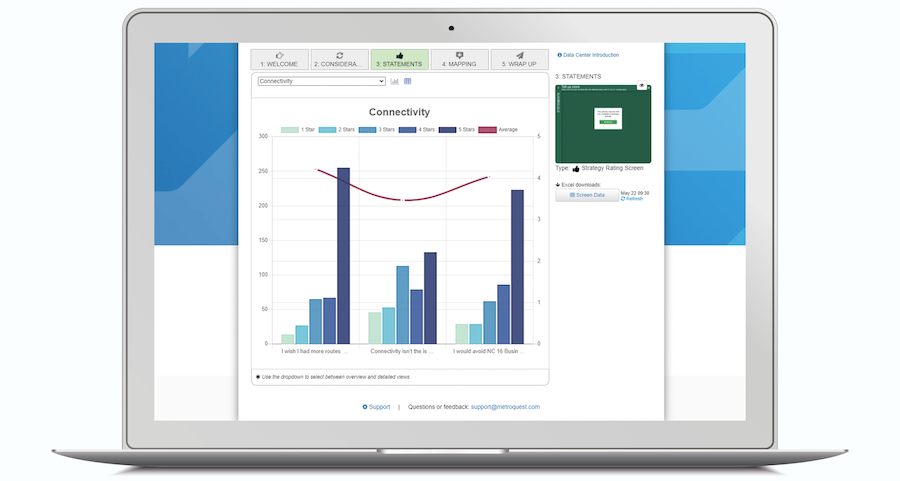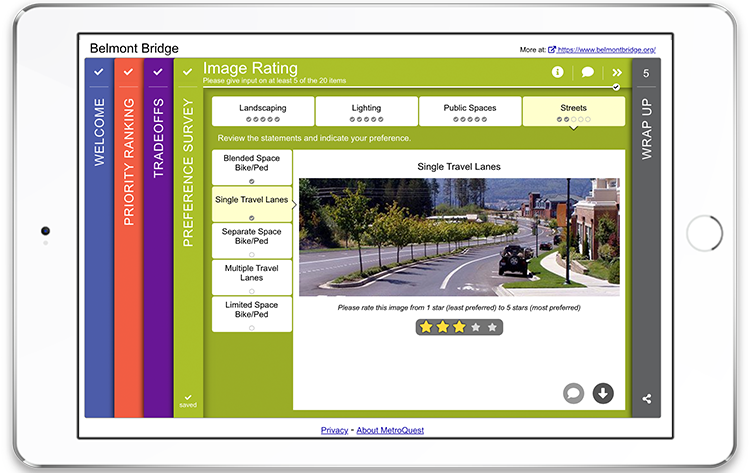10 Tips for Crafting an Effective Online Public Engagement Survey
![10 Tips for Crafting an Effective Online Public Engagement Survey [TIPS] 10 Tips for Crafting an Effective Online Public Engagement Survey](https://metroquest.com/wp-content/uploads/10-Tips-for-Crafting-an-Effective-Online-Public-Engagement-Survey.png)
Configuring Online Surveys with your Plan in Mind
Online surveys are an effective public engagement tool that can be used for projects big and small. Last month, Dave Biggs, our Chief Engagement Officer, uncovered both the art and science behind crafting exceptional online surveys to achieve actionable results. Let’s explore 10 tips that help ensure your online surveys are optimized for great public engagement!
The Art of Crafting Effective Online Surveys
Crafting an effective online survey is a bit of an art and a bit of a science. Here are 5 tips that revolve around the art of crafting great online surveys:
Tip #1: Up your survey completion rate by making it fun & compelling.
Ask yourself: is this the kind of survey that I’d be excited to take and share with others? You can make the user experience more enjoyable and compelling by incorporating things like mini games, images, interactive maps, and colorful buttons.
Tip #2: Educate participants about the project’s context and complex planning topics such as tradeoffs.
Embed microlearning moments into the survey to ensure the public is well-educated about the project and can provide you with informed input and knowledgeable answers that give you and your technical team the data that you need to move forward.
Tip #3: Make sure the online survey is optimized for mobile.

Most participants will complete your online survey on their phones so make sure your survey is optimized for all types of devices. If you’re using the Chrome browser, you can use the built-in tools to preview your survey or website in mobile format.
Tip #4: Craft effective survey questions.
Think about how you can constructively ask questions in a way that’s compelling, while helping the public grasp the scope and the scale about what’s at stake and the alternatives and options that exist for your plan.
Tip #5: Use more visuals and less text.
As Biggs revealed during the webinar, “a picture is worth a thousand words that you can read in three seconds.” Incorporate enticing images into your survey to help keep the experience short and participants engaged.
The Science of Crafting Effective Online Surveys
In addition to the creative aspects of making a survey, there are technical elements that can be optimized to make an effective online survey. Here are 5 additional tips with respect to the science of creating an exceptional public engagement survey…
Tip #6: Leverage social media to increase your survey participation.
Social media is a powerful tool that can be used to promote your online survey and target specific audiences. This helps to ensure you’re reaching a broad audience and that your survey results are a true representation of the public’s needs and wants.
Tip #7: Constantly monitor & target your results.

An example of a data set generated by a MetroQuest online survey.
Make sure you have full visibility into your participant data to help you identify the types of individuals that have participated and spot any gaps. Collecting demographic information is crucial for this. For example, if you notice that you haven’t heard from individuals from a particular demographic group, you can use this data to adjust your promotional efforts accordingly.
Tip #8: Offer privacy & convenience.
Make the survey experience convenient by providing the public with the opportunity to participate at any time of day, for instance. Use an anonymous data collection tool where each participant is given the chance to voice their opinions without feeling challenged or bombarded by misinformation or opinions of others.
Tip #9: Make your surveys short & impactful.
To optimize participation and completion rates, make sure your surveys are designed for participants to complete in 5 minutes or less. Studies show that surveys that appear shorter have higher completion rates!
Tip #10: Blend both quantitative & qualitative questions.
While qualitative questions are important, it can be challenging to quantify public input and summarize results by strictly asking open-ended questions. Use quantitative questions with set responses, while giving participants the opportunity to submit optional comments throughout.
